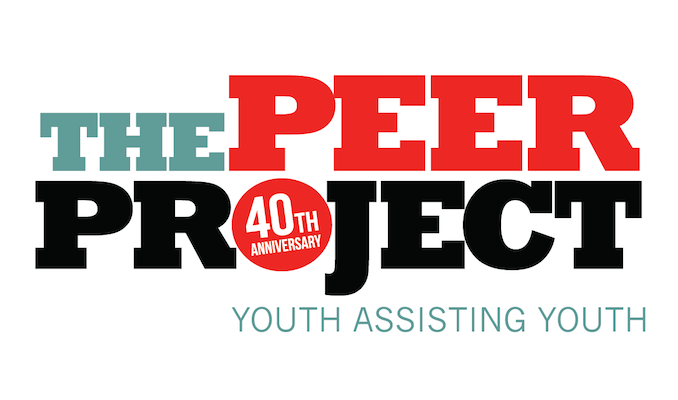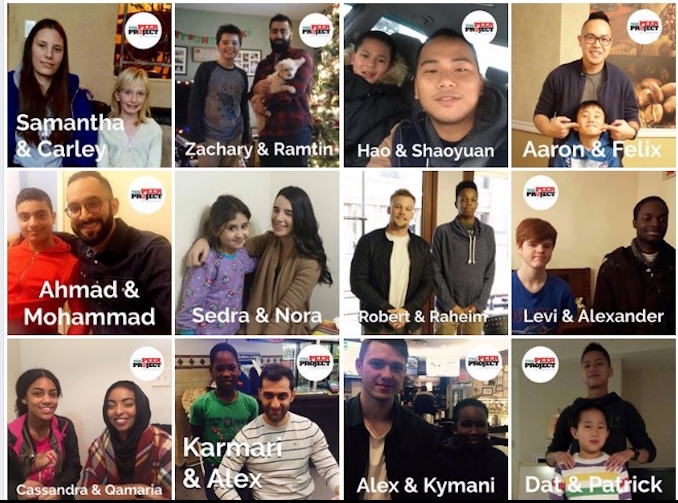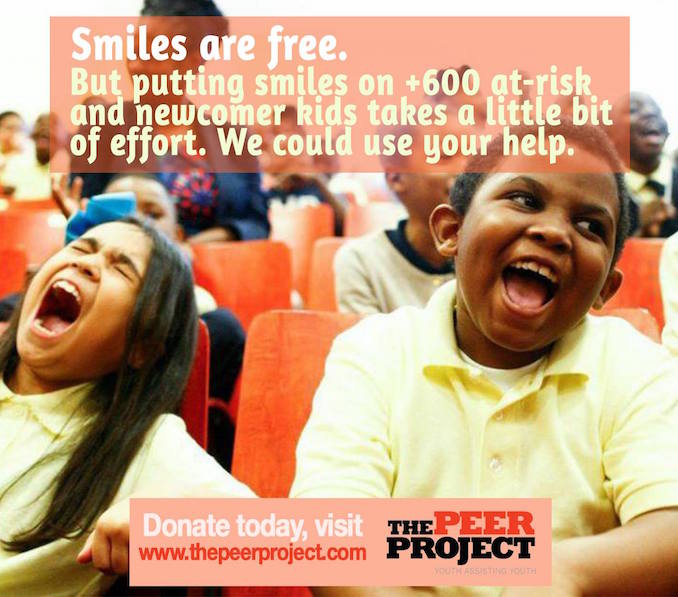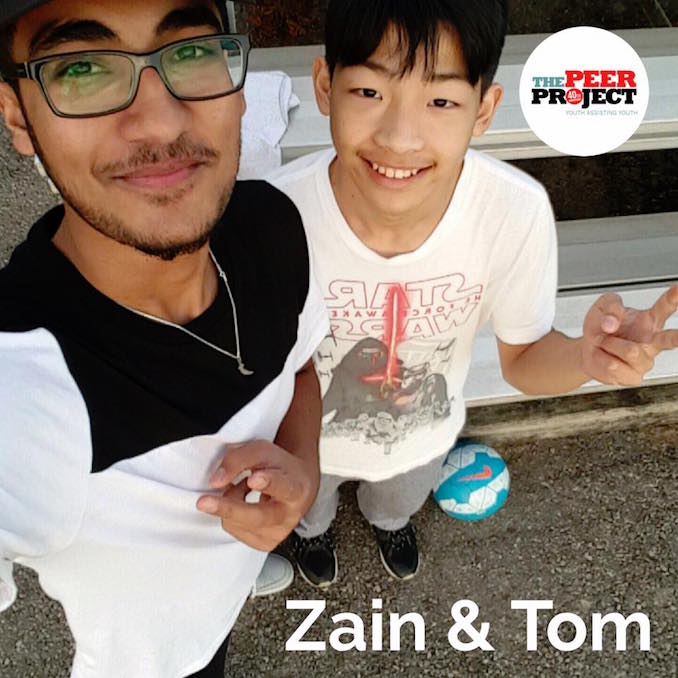I recently chatted with Ed Carlson who is the Director of Development at The Peer Project, Youth Assisting Youth. The organization runs a peer mentoring program similar to Big Brothers and Big Sisters with the mentors being younger in age which creates a different relationship between mentor and mentee – one of a peer rather than authority figure. Mentors range in age from 16-29 with participating mentees being 6-15.

How does the peer mentoring differ from adult mentoring?
A Peer Mentoring model includes youth mentoring youth, where the mentor is an “elder youth” or slightly older than the mentee. As you know we use a peer mentoring model, hence the name The Peer Project | Youth Assisting Youth. Actually, our registered charity name with Canada Revenue Agency is Youth Assisting Youth, and we only added The Peer Project about 4 years ago. Our program is a community based (meaning that mentors and mentees meet in the community) peer mentoring program that matches at-risk and newcomer youth, ages 6 to 15, with fully trained volunteer youth mentors, ages 16 to 29. Mentors spend an average of 3 hours per week with their mentee for a minimum of 1 year. The average length of our mentoring relationships is 5 years, with many developing into lifelong friendships. We focus on supporting youth with mental health issues, learning disabilities and other complex social, emotions, behavioural and/or cultural adjustment challenges.
Peer to peer / youth to youth mentoring, in our experience, leads to a deeper, faster and more transformative impact on the mentee, as kids are more likely to open up about their problems and issues with someone who is around their own age, as opposed to an adult. Trust between the mentor and mentee develops faster through a peer mentoring model, since the mentor and mentee are close in age and share common interests, etc. Also, just so you are aware, our program uses a pre- and post- test evaluation survey to measure the impact that our program has on youth mentees. Our program is proven to build resiliency in youth mentees, as well as confidence/self-esteem, social skills, leadership abilities and improved academic performance.
How many total youth have been mentored to date?
This year is our 40th anniversary and we’ve been matching at-risk youth with mentors for a long time. If I had to put an estimate to the number of youth who have received a mentor through our program since 1976, I would say an estimated 5,100 youth have been mentored to date through our program. This number only includes new, one-to-one mentor matches, and doesn’t include youth who are re-matched or mentored through our Group Mentoring Program. Our volunteer youth mentors also benefit greatly from the mentoring relationship with increased job/career skills, confidence, empathy/compassion, leadership skills and a sense of belonging and accomplishment. So in total, an estimated 5,100 volunteer youth mentors and 5,100 youth mentees have been matched in a new one-to-one mentoring relationship and have benefited from our services.
Is it parents or schools that you work with to match mentors with kids?
All mentees in our program must be referred by a professional and not the parent. We only accept parent referrals if the family is new to the country for less than 5 years. The majority of our mentee referrals come from schools (guidance counselors, teachers, etc.), settlement services agencies (we focus on supporting newcomer youth), child welfare organizations, doctors, social workers, etc. We also conduct ongoing outreach in the community (meetings, presentations, etc.) with organizations that work with youth ages 6 to 15 (our mentee age range), so that they are aware of our services and will refer at-risk and newcomer kids to our program for a mentor.

We recruit volunteer youth mentors from colleges, universities, the community and the workplace. We have 2 full time volunteer recruiters who work hard to recruit volunteer youth from anywhere in the community. We post online volunteer postings on all job / school sites and make ongoing presentations at volunteer fairs, etc. All youth mentors must complete a police background check, submit 3 professional references and complete our mandatory training.
Staff social workers complete in-home assessments of all potential mentors and mentees to understand their interests, specific needs, goals, etc. Our staff social workers complete the assessments and then make matches on the following criteria:
- Gender (we typically only match male to male and female to female. However, we will match a female mentor with a male mentee, if the male mentee is under the age of 10 years.)
- Location (we match mentees with mentors who live in close proximity and are able to make the 3 hour per week commitment without having to travel very far)
- Background (we often match mentees with mentors who are from a similar background)
- Specific interests (we match mentees with mentors who have similar interests)
- Special needs (many of our mentees have mental health issues or learning disabilities and we only match those mentees with mentors who are able to handle those special needs. We do provide Youth Mental Health Training and Youth Learning Disabilities Training, to help mentors understand how to mentor a child with these types of issues)
How do the parents or schools find you?
We have a 40 year history and positive reputation within Toronto and York Region school. Many schools know of us and we are constantly conducting outreach to create awareness about our program. We’re also very searchable on the internet if parents are looking for a mentoring program for their child.
What kids would qualify for this mentorships? How do parents/teachers know if their youth is a right fit?
Our motto is that every kids deserves a mentor, regardless of their background, medical issues, socio-economic status or postal code. We do focus on supporting youth with mental health issues and learning disabilities, as well as supporting newcomer youth. But our program accepts any youth who is struggling with any issue – including bullying, social isolation, poor school grades, obesity/lack of physical activity, behavioural issues, emotional issues, social issues, etc. Youth mentoring addresses any and all issues that youth are facing

What types of activities do mentors take part in with the youth? Are they one-on-one or are their group events as well?
The mentor and mentee decide each week what activities they want to do. However, during our “match meeting”, where we make a mentor match and introduce the mentor and mentee, we establish goals, roles and responsibilities. Each mentor match focuses on the specific activities that the mentee needs and determined in the match meeting. Activities could include tutoring, physical activity, learning about the community, trips to the movies, the library, community events, skating, etc. We also provide ongoing, free monthly events and activities for our mentor matches, including sports program (bowling, soccer, basketball), movie nights, trips to Jays and Raptors games, theatre productions, trips to the museum, etc. We provide these ongoing, free activities to reduce the social and financial strain / burden on volunteer youth mentor; and it helps them build and develop their relationship faster.
What are some of the biggest challenges you face?
The 2 greatest challenges that we face each day is in recruiting male youth volunteers, and raising enough funding to support our program. Recruiting male youth to volunteer as mentors is very difficult. Roughly 70% of the youth that volunteer with our program are female; and roughly 70% of the mentees that are referred to our program for a mentor are boys. Since we only match males to males and females to females, we have a systemic shortage of male volunteer youth mentors. The simple fact is that female youth are more likely to volunteer and give back to the community. Where male youth are not as likely to volunteer. Also, since our program is a large commitment of 3 hours per week for a minimum of 1 year, many male youth are scared of the commitment level.
Our second greatest challenge is fundraising. There are literally thousands of charities in Toronto that are all fighting for funding grants and donations. Also, we must identify donors that want to support youth mentoring, which is difficult as most donors want to give to support health research, education and the environment. We are constantly researching and requesting funding grants from all levels of government (federal, provincial and municipal funding), public and private foundations, corporations and members of the community. But one of our greatest challenges is securing enough grants and donations to allow us to support the growing number of youth who are referred to our program for a mentor.
Do you have any annual fundraisers we should know about?
We conduct two annual fundraisers each year. Our biggest is our Annual Spin-a-Thon, typically conducted each year in January. The Spin-a-Thon is a fundraising event hosted by Energia Athletics spin studio at Pape and Danforth where members of the community register to spin in one or more spin classes and agree to fundraise a minimum of $100 to support our program. Spinners sign up, select their spin classes and then fundraise to their family and friends using our online portal. The event averages 100 registered spinners and roughly 500 individual donations each year. This year’s 5th Annual Spin-a-Thon was just conducted on January 28th and included 98 spinners, 497 donations and a total of $35,500 raised for our youth mentoring programs. It was a huge success! Here are a couple of links to a story on our 2 most recent spin events:
http://thepeerproject.com/2017-spin-a-thon-a-success
http://thepeerproject.com/spinning-to-success-nearly-30000-raised-at-the-2016-spin-a-thon
Our second annual fundraiser is our Best Dinner Ever fundraising dinner. This event is conducted in the restaurant of a “celebrity chef” and all proceeds from ticket sales, raffle prizes, etc. go directly to support our youth mentoring programs. Our last Best Dinner Ever was actually conducted in 2015 at the restaurant of celebrity chef Lynn Crawford – Ruby Watchco. Our 2017 Best Dinner Ever is scheduled for April 2017 and will be hosted at celebrity chef Massimo Capra’s new restaurant “Capra’s Kitchen” in Mississauga. Here’s a link to a story on our website about the 2015 Best Dinner Ever:
http://thepeerproject.com/glen-and-jamie-present-bde2015

How can our readers help?
Your readers can help in a few ways. First, if they are between the ages of 16 and 29, and they’re able to make a commitment of an average of 3 hours per week for at least 1 year, I would urge them to volunteer with our program as a youth mentor. The program is absolutely life-changing for both the mentee and mentor. As a youth mentor, they will literally change the course of a young person’s life and give them hope for a bright future. They will help their mentee overcome their struggles and act as a positive role model to a kid that desperately needs support. They will help their mentee develop resiliency, confidence, social skills, leadership abilities and overcome their personal struggles. As a mentor, they will benefit from an increase in job/career related soft skills, communications skills, leadership abilities, confidence, empathy and true sense of accomplishment. Please visit our website here to learn apply:
http://thepeerproject.com/become-a-mentor/
Secondly, your readers can help to spread the word about our program to their networks. If any of your readers know of a child who is between the ages of 6 and 15 and in need of any type of support, please have them referred to our program. Also, share our website with your networks / colleagues who are working with at-risk or newcomer kids. Follow us on social media and share our pages with your networks. Here are some links:
https://www.facebook.com/thepeerproject/
https://twitter.com/PeerProject
https://www.youtube.com/channel/UC75x7By1FRHbsFJIRus4FhA
https://www.youtube.com/watch?v=sxZETAri1-I
https://www.youtube.com/watch?v=QX7azcZ_Yug
https://www.instagram.com/thepeerproject/
Lastly, we are desperate for funding and donations to support our life-changing programs. If any of your readers are in a position to make a financial contribution we would urge them to make a donation through our website. We also accept checks made payable to Youth Assisting Youth. In addition, your readers could conduct 3rd party fundraisers on behalf of our agency and do some fundraising in the community. Here’s a link to our donation page:
https://secure.e2rm.com/registrant/startup.aspx?eventid=41822
Please contact Ed Carlson, Director of Development, at 4106-932-1919 x:222 or ecarlson@yay.org with any questions regarding our agency, program or donations.
Pay it Forward: Tell us about another charity in Toronto we should know about.
Building Up is a Toronto charity that works with at-risk youth (and others from the community who are facing barriers to employment) by training with new skills and provides them with economically viable solutions to employment. Building up basically trains at-risk youth to retrofit toilets and then install them within the city’s low-income housing. The charity provides sustainable employment to those who need it most, while also helping housing providers to cut costs and reduce utility bills.

